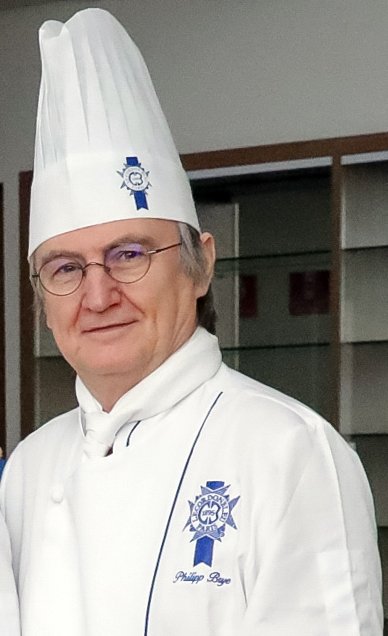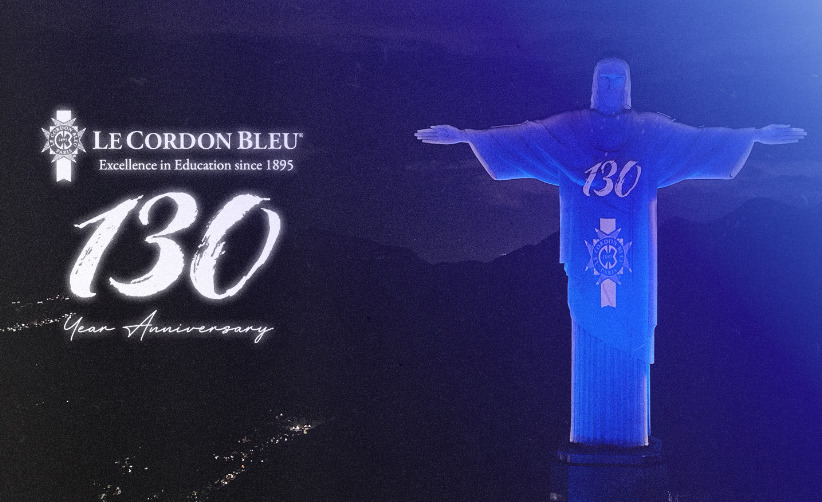
In this interview, the chef talks about his career and gives advice to new students
At age six, chef Philippe Brye was already making English cake with his mother. It was just the beginning of a long career surrounded by sweets, which he loves. "I've never in my life thought of doing anything but being pâtissier", he says.
Born in Normandy, in Northwestern France, Philippe Brye began his career at the famous Fauchon, in Paris. In 1980, he landed in Rio, where he was executive chef of the Troigos group, chef confectioner of the Meridien and Sofitel hotels, and also opened his confectionery Traiteurs De France.
During his career, Philippe Brye has cooked to important personalities, such as presidents of Brazil, João Figueiredo and Fernando Henrique Cardoso, and the French President Jacques Chirac, and won medals in New York and Paris. Today, he celebrates a new phase of his career, as the chef responsible for the Pâtisserie course at Le Cordon Bleu in Rio de Janeiro: "My satisfaction is to be able to teach my knowledge to this youth."
After so many years ahead of famous restaurants, how is the experience of being a teacher at Le Cordon Bleu? Philippe Brye - I think it's cool because I got to an age that I have a lot of experience and I want to share with the new generation. My satisfaction is to be able to teach my knowledge to this youth. Making a recipe is easy, but it´s hard to know the method and Le Cordon Bleu teaches the best techniques in the world with the best products and equipment. In addition, students learn individually.
How did your interest in gastronomy come about? Philippe Brye - I started practically six years old (laughs). When I was very young, I liked to eat sweets and helped my mother to make English muffin. At first, my interest was just to eat, but then I learned to do it myself and I started to enjoy cooking too. I have never in my life thought of doing anything but being sweet.
So the specialization in pâtisserie was a natural way?
Philippe Brye - Since I was a child I like that, but when I started to learn confectionery what attracted me most was the artistic work and in France we do a lot of contests. I love making chocolate, sugar decoration ... My life is very linked to everything that is artistic. If I wasn’t a pâtissier, I would definitely be a photographer.
And how were the first steps of your career? Philippe Brye - My life began at Jean Ferrandi School in Paris. In the first year, I finished in the first place. As in the second year we had to take an internship, I was chosen to do at the Fauchon, which at the time was the best confectionery in France. Then, when I finished school, I started working there.
What challenges did you face in the beginning?
Philippe Brye –The initial difficulty is that the confectionery is extremely technical. Handling the pastry bag is extremely difficult, regularity, speed ... It takes us years to learn how to make the decorations. And in our profession, we have to be precise and very fast. To give you an idea, at Fauchon I had to make thousands of macaroons in a day.
I got to an age that I have a lot of experience and I want to share with the new generation. My satisfaction is to be able to teach my knowledge to this youth.
How were the first years in Brazil?
Philippe Brye – Brazil was one of my dreams. When you live in a cold country like France and in the countryside, which is not a beautiful place, you dream about tropical countries. But in relation to gastronomy, when I got here it was very strange. In Paris, at Fauchon, it was easy to work because we had everything we needed and here we had almost no product. It was a challenge. I made macaron for three years in France and when I got here I could not do it because the ingredients were different and the humidity didn’t help. Also, I remember that at that time, there was a restaurant in Botafogo that was called Club Gourmet. I was invited to teach and wanted to make a passion fruit pie. The owner (José Hugo Celidonio) was amazed because in Brazil this candy was not made and it was very common in France. Nowadays everyone knows how to do it, but I was the first one (laughs). After a few years, I worked with Claude Troigros and Roland Villard at the Sofitel and I could learn a lot from them.
How do you evaluate the last years of gastronomy in Brazil?
Philippe Brye – In a positive way, because when I arrived in Brazil, the profession was very devalued and today we have great cooks, with the glamor of the famous chefs and programs like the MasterChef, that helped to change the perception of the profession. The downside is that many young people think they are going to leave school as chefs when, in fact, it takes many years for the professional to become a recognized chef. There is no chef's degree, but a cook’s or pâtissier’s diploma.
How did the confectionery industry change in recent years?
Philippe Brye – Everything has changed a lot, both the look and the techniques employed. Today we have incredible materials that allow us to make different recipes and the internet make the communication easier among confectioners around the world who can learn much more. In the old days, we only had the books! The speed of learning today is very fast. Every week I download a recipe or dozens of photos I like. Every day we see an innovation. Ten years ago, if someone asked me to make a different recipe, I would think of a simply delicious dessert. But nowadays, I have to think about the association of flavors, textures and know how to enhance the flavors with salt flower or acidity.
The advice is that they must be insightful, not robots! Think always!
Do you have a favorite dessert?
Philippe Brye - I don´t have a favorite one, I like them all! But after so many years of tasting desserts, nowadays I prefer the most homemade ones, such as a crepe, a simple crème brûlée, a condensed milk pudding, to the sophisticated ones. I like desserts that mix hot and cold elements. Perhaps my favorite today is pavlova, which is very fashionable, made basically with meringue, fruit and whipped cream.
What is your advice to new students coming to Le Cordon Bleu?
Philippe Brye – They must be very attentive, precise and have a great visual memory to learn the techniques because the technique is everything! Details make the difference. A milk that boils longer than necessary can end up with a recipe. The advice is that they must be insightful, not robots! Think always!

